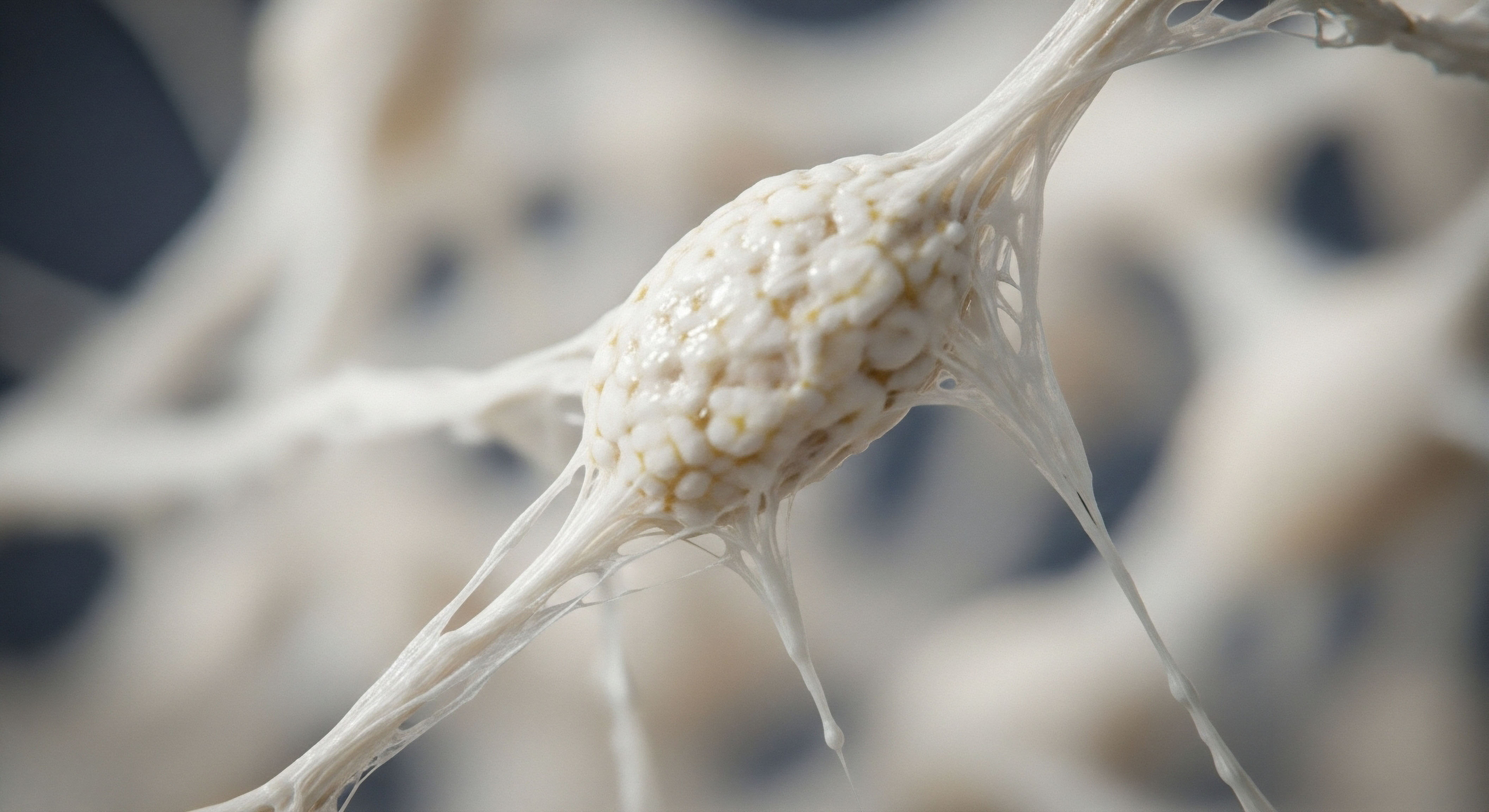

Unseen Forces Governing True Restoration
Deep rest extends beyond the mere cessation of consciousness; it embodies a sophisticated biological recalibration. The body executes its most vital restorative processes during sleep, a period governed by an intricate network of hormonal signals. This nightly command center dictates cellular repair, cognitive consolidation, and metabolic efficiency, shaping daily vitality and long-term health. Ignoring the profound influence of endocrine balance on sleep quality represents a fundamental oversight in the pursuit of peak human performance.
The endocrine system orchestrates a symphony of biochemical events essential for restorative sleep. Hormones act as precise messengers, directing the timing and depth of sleep stages. Disruptions within this delicate equilibrium manifest as fragmented sleep, reduced recovery, and diminished cognitive function. The consequences ripple through every physiological system, impacting everything from metabolic health to mental acuity.

The Cortisol Conductor ∞ Circadian Rhythm’s Imperative
Cortisol, often labeled the “stress hormone,” plays a critical role in setting the body’s internal clock. Its circadian rhythm dictates an early morning peak, gradually declining throughout the day to reach a nadir in the late evening. This natural descent facilitates the transition into rest.
When sleep opportunity is constrained to less than 5.5 hours, afternoon and evening cortisol levels can rise, disrupting the essential low-cortisol window for deep sleep. Elevated cortisol levels frequently link to mood disorders, further complicating sleep architecture. The corticotropin-releasing factor (CRF) neuron, when excessively active under stress, can trigger insomnia, highlighting the direct neural-endocrine link.

Melatonin’s Nocturnal Command
Melatonin, produced by the pineal gland, commands the initiation and quality of sleep. Its secretion peaks at night, signaling the body’s readiness for rest, and declines with daylight. Melatonin influences the precise architecture of sleep, including the crucial slow-wave sleep (SWS) and REM stages. A consistent melatonin rhythm supports the body’s innate ability to cycle through these restorative phases, crucial for both physical and mental rejuvenation.
“A week of sleeping less than five hours nightly can reduce testosterone levels in young men by 10-15%, mirroring the hormonal decline observed over a decade or more of aging.”

Growth Hormone ∞ The Body’s Nightly Repair Agent
Human Growth Hormone (GH) performs as the body’s primary repair agent, with up to 75% of its daily secretion occurring during deep sleep. This nocturnal surge is fundamental for tissue repair, protein synthesis, fat metabolism, and cellular regeneration. A deficiency in GH frequently correlates with impaired REM sleep, increased body movements during sleep, and altered sleep microstructure, impeding the body’s capacity for overnight restoration.

Sex Hormones ∞ Sleep’s Silent Partners
Testosterone levels directly influence sleep quality in men. Lower testosterone frequently associates with reduced sleep efficiency, more nocturnal awakenings, and less time spent in slow-wave sleep. Short sleep duration significantly impacts testosterone production; studies show that less than five hours of sleep per night for a week can reduce testosterone levels in young men by 10-15%, an effect comparable to aging by 10-15 years.
In women, progesterone exhibits sleep-promoting effects, particularly through its neuroactive metabolites. A steep decline in progesterone, such as during the late luteal phase of the menstrual cycle, often associates with sleep disruption. Estrogen and progesterone collectively contribute to improved sleep quality during the menopausal transition.

Thyroid Hormones ∞ Metabolic Regulators of Rest
Thyroid hormones (T3 and T4) directly influence the neurotransmitter systems governing sleep. Hypothyroidism, characterized by insufficient thyroid hormone production, frequently presents with shorter sleep durations, heightened alertness, and alterations in REM sleep, leading to both hypersomnia and insomnia. Conversely, hyperthyroidism, an excess of thyroid hormones, associates with difficulty initiating and maintaining sleep, alongside excessive daytime sleepiness. Balancing thyroid function proves essential for mitigating these sleep disturbances.


Precision Tuning for Deep Sleep
The pursuit of profound rest demands a strategic, multi-pronged approach to hormone balance. This involves more than superficial remedies; it requires a deep understanding of the body’s endogenous signaling systems and targeted interventions that recalibrate them. The goal extends beyond merely inducing sleep; it aims to optimize the entire nocturnal repair and regeneration cycle, transforming sleep into a performance advantage.

Melatonin Mastery ∞ Orchestrating the Circadian Rhythm
Melatonin optimization begins with rigorous light hygiene. Minimizing exposure to blue light in the evening hours signals the body to increase natural melatonin production. Strategic, low-dose exogenous melatonin, particularly prolonged-release formulations, can support the natural nocturnal curve, especially for individuals with age-related declines in production or disrupted circadian rhythms.

Cortisol Modulation ∞ Taming the Stress Response
Managing cortisol dysregulation involves stress reduction techniques, including mindfulness and structured recovery protocols. Adaptogenic compounds can support adrenal function without overstimulation. Precise timing of vigorous physical activity, ensuring its completion well before the evening cortisol nadir, prevents unwanted stimulation. A structured approach to evening wind-down rituals also reinforces the body’s natural transition to lower cortisol states.

Growth Hormone Support ∞ Activating Nocturnal Repair
Optimizing growth hormone secretion during sleep involves a combination of lifestyle and targeted peptide therapies. Consistent deep sleep, strenuous exercise earlier in the day, and specific nutritional strategies (e.g. protein intake before bed) support natural GH release. For a more direct intervention, Growth Hormone-Releasing Peptides (GHRPs) and Growth Hormone-Releasing Hormone (GHRH) analogs represent a sophisticated pathway.

Peptide Protocols for Enhanced SWS
- CJC-1295 with Ipamorelin: This combination acts synergistically to stimulate the pituitary gland, promoting the release of GH and Insulin-like Growth Factor 1 (IGF-1). This process directly enhances deep wave sleep (SWS), crucial for physical recovery, cellular repair, and metabolic balance. Clinical applications often involve evening administration to align with the body’s natural nocturnal GH pulse.
- Sermorelin: As a GHRH analog, Sermorelin stimulates the endogenous production of GH, fostering a more natural and sustained release. This action improves the quality of slow-wave sleep without the risks associated with direct, exogenous GH administration, which can inhibit the body’s own production.
- Delta Sleep-Inducing Peptide (DSIP): DSIP directly promotes deep, delta-wave sleep, the most restorative phase of the sleep cycle. Its mechanism involves targeting specific brain regions to support a calmer sleep state.
- Epitalon: This synthetic peptide assists in regulating melatonin production and aligning the body’s circadian rhythm, further solidifying the foundation for deep, consistent rest.
These peptides function as sophisticated regulators, helping the body re-establish its natural rhythms, calming stress hormones, and enhancing restorative sleep without the sedating effects or dependency associated with traditional sleep aids.
For individuals with diagnosed deficiencies, such as low testosterone in men or significant progesterone declines in women, hormone replacement therapy (HRT) becomes a precision tool. Tailored testosterone replacement can restore sleep efficiency and increase time in slow-wave sleep for men with deficiencies. For perimenopausal women experiencing sleep disturbances, oral micronized progesterone, typically 300 mg at bedtime, demonstrably reduces night sweats and improves sleep quality by increasing slow-wave sleep duration.
Thyroid hormone optimization involves careful monitoring of TSH, T3, and T4 levels, followed by precise titration of replacement therapy if a deficiency is present. Addressing underlying thyroid dysfunction alleviates associated sleep disturbances, restoring proper sleep architecture. My experience confirms that these interventions yield measurable improvements, elevating daily function.


The Timelines of Transformation
Committing to hormone balance for deep rest represents a long-term investment in biological supremacy. The body’s intricate systems require time to adapt and recalibrate, and patience becomes a critical component of the protocol. Initial shifts in sleep quality, energy, and recovery can manifest within weeks, with more profound, systemic changes unfolding over months.

Early Indicators of Progress
Within the first 4-8 weeks, individuals frequently report improvements in sleep onset latency and a reduction in nocturnal awakenings. Subjective feelings of refreshed awakening and sustained daytime energy emerge as the circadian rhythm stabilizes and initial hormonal imbalances begin to correct. For those undergoing melatonin or progesterone interventions, these early improvements are often the most noticeable, setting a positive trajectory.
My personal journey, navigating the complexities of high-demand performance, revealed these early wins as potent motivators, a glimpse into the body’s renewed capacity.
“Progesterone administration can increase slow-wave sleep duration by almost 50% and total slow-wave activity by nearly 45% in postmenopausal women with disturbed sleep.”

Sustained Optimization and Deeper Shifts
Months 2-6 bring more substantial, objective improvements. Polysomnography often reveals increased slow-wave sleep duration and enhanced sleep efficiency, indicative of deeper, more restorative sleep cycles. This period sees the cumulative effects of optimized growth hormone secretion, manifesting as improved physical recovery, enhanced body composition, and sharpened cognitive function. Consistent adherence to personalized protocols, including peptide therapies, consolidates these gains, building a robust foundation for enduring vitality.
The journey towards hormonal equilibrium demands continuous monitoring. Regular blood work provides quantifiable data, allowing for precise adjustments to therapeutic protocols. Bio-individuality remains paramount; what functions optimally for one person may require fine-tuning for another. This iterative process, guided by clinical data and subjective experience, refines the approach, ensuring sustained progress toward peak performance. The aim involves establishing a new baseline, where deep rest becomes an intrinsic, predictable function of a well-tuned system.
This commitment transcends temporary fixes. It establishes a lifestyle where hormonal health becomes a non-negotiable aspect of daily operation. The sustained pursuit of deep rest via hormone balance yields dividends across all domains of existence, from mental clarity and emotional resilience to physical strength and longevity. The transformation moves beyond improved sleep; it defines a life lived with an unwavering edge.

The Sovereign State of Deep Rest
Reaching the sovereign state of deep rest represents a pinnacle of biological control. It signifies a body operating at its inherent best, a system where every cellular process receives its precise nocturnal directive. This level of restoration translates directly into unparalleled waking performance, cognitive acuity, and a profound sense of well-being. It is the ultimate expression of human optimization, where the nights recharge the very essence of your days.
This pursuit of hormonal precision transforms the understanding of sleep. It moves beyond a passive requirement into an active, intelligent strategy for maximizing human potential. The disciplined application of targeted interventions, informed by scientific rigor, allows individuals to reclaim their nocturnal command, redefining what is possible in terms of recovery and output. This journey demands commitment, yet the dividends it pays in sustained vitality are immeasurable.
The commitment I advocate is not for the faint of heart; it requires a willingness to engage with one’s own biology at a fundamental level, to question the accepted norms of aging and performance. This path, for me, has always been about extending the limits of what is possible, pushing the boundaries of human capacity through relentless optimization. It is a philosophy for living, a testament to the power of precision.



